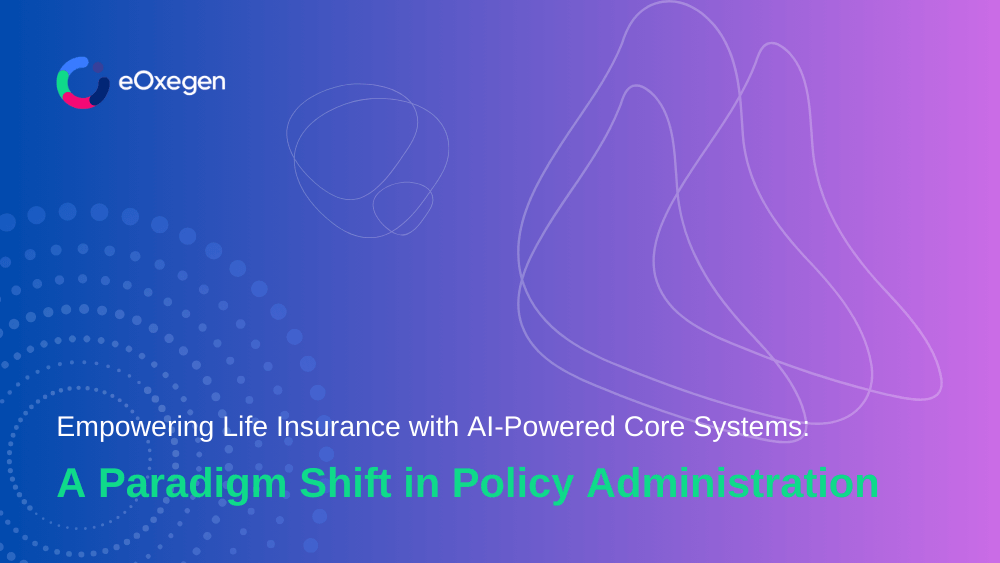Empowering Life Insurance with AI-Powered Core Systems: A Paradigm Shift in Policy Administration
18 Feb, 2024

The global economy has gone through severe ups and downs in recent years. The growing digital competition, the slowdown of organic demand in developed nations, pricing pressures from charge transparency, and consumers' constantly high expectations are some of the main problems facing insurers. As a result, innovation is no longer merely an option but rather a requirement for successful insurance business models. In light of this, insurers may use modern business solutions like insurance policy administration software to better handle enormous data sets, adjust to shifting customer demands, and respond to competitive challenges.
A policy management system can streamline the creation, administration, and distribution of policies and procedures, leading to improved customer experiences. But how specifically could insurance policy management software support business growth? Now let's look into it.
In the dynamic landscape of the insurance industry, staying ahead of the curve is essential for success. With the advent of Artificial Intelligence (AI), life insurance companies are witnessing a transformative shift in their core systems, particularly in policy administration. This paradigm shift is not just a technological upgrade; it's a strategic move that enhances efficiency, reduces costs, and provides a seamless experience for both insurers and policyholders.
Challenges in Manual Policy Management Systems
Manual processes are often used in conventional policy management, which results in deviations, errors, delays, data silos, and increased administrative duties. Given this, it should not be shocking that over 65% of life insurance businesses think that gathering data manually slows down operations and lowers profits. Not to mention, the growing and inflationary weight of resource requirements, which may include people, real estate, commodities, etc. Makes traditional policy management more unsustainable and ineffective.
Consequently, the severely limiting issues associated with traditional insurance management make it difficult for insurers to remain profitable. These difficulties also prevent growth.
The Role of AI in Policy Administration Systems
Traditionally, policy administration in the insurance sector involved a plethora of manual tasks, leading to delays, errors, and increased operational costs. However, the integration of AI-powered core systems is revolutionizing how insurance policies are managed. The use of advanced insurance policy management software has become crucial for insurers aiming to streamline their processes and improve customer satisfaction.
Insurance Policy Management Software: A Game-Changer
The introduction of cutting-edge insurance policy administration systems has significantly improved the overall efficiency of insurance companies. These systems leverage AI to automate various tasks, from policy issuance to claims processing, resulting in faster turnaround times and enhanced accuracy.
One of the key advantages of AI-powered policy administration solutions in insurance is their ability to handle vast amounts of data swiftly and accurately. This not only reduces the risk of errors but also allows insurers to gain valuable insights from the data, contributing to better decision-making.
Benefits of AI-Powered Policy Administration Systems
Enhanced Speed and Efficiency
AI streamlines policy administration processes, automating routine tasks such as data entry, underwriting, and premium calculations. This not only accelerates the policy issuance process but also ensures a quicker response to customer queries and claims.
Improved Accuracy and Risk Management
By automating complex calculations and risk assessments, AI minimizes the likelihood of errors in policy administration. This, in turn, enhances risk management and ensures that policies are accurately priced based on the individual risk profiles of policyholders.
Customer-Centric Approach
AI-powered systems contribute to a more customer-centric approach by enabling insurers to offer personalized policies and services. These systems can analyze customer data to tailor insurance offerings, creating a more engaging and satisfying experience for policyholders.
The Future of Policy Administration System in Insurance
The future of policy administration in the insurance sector lies in the continued integration of AI and machine learning technologies. As these systems evolve, insurers can expect even more sophisticated capabilities, such as predictive analytics for claims processing, chatbots for customer interactions, and real-time monitoring of policy performance.
Policy Administration Solution in Insurance: Meeting Future Challenges
To remain competitive in the evolving landscape, insurance companies are adopting comprehensive policy administration solutions. These solutions not only address current challenges but also position insurers to adapt to the changing needs of the industry. The incorporation of AI ensures that these systems are not just adaptive but also predictive, allowing insurers to proactively address emerging trends and risks.
Conclusion
The incorporation of AI-powered core systems in policy administration is a game-changer for the life insurance industry. The use of advanced insurance policy management software and policy administration solutions is not just a technological upgrade; it's a strategic move that empowers insurers to provide efficient, accurate, and customer-centric services. As the industry continues to evolve, embracing AI is not just an option; it's a necessity for insurers looking to thrive in the competitive landscape of the future.
Recent Articles
- How do Big Insurers Engage with the New-Age InsurTech Companies?
- Insurance Management System Integration: Maximizing Efficiency and Performance
- Will Blockchain Technology Reshape the Insurance Market?
- The Future of Health Insurance: Predictive Analytics and AI
- Buy or Build Insurance Software? A Game-Changing Question in Insurance Industry